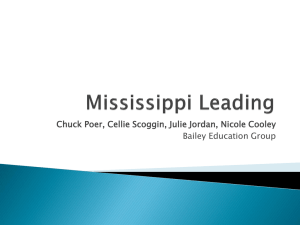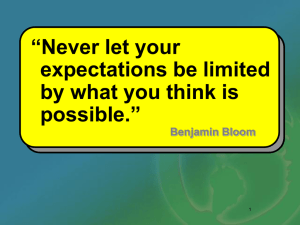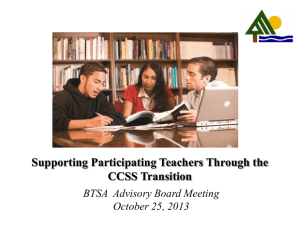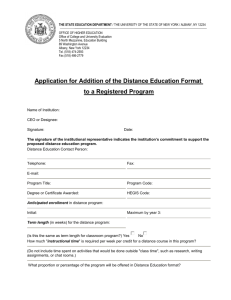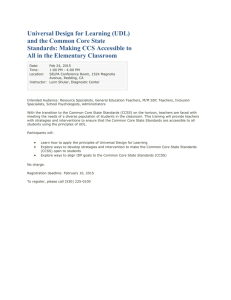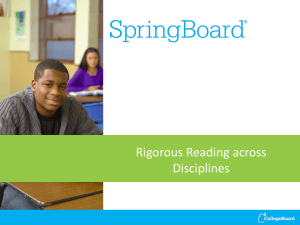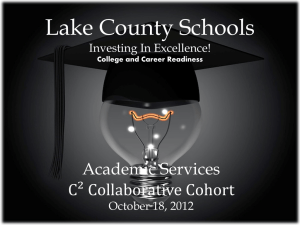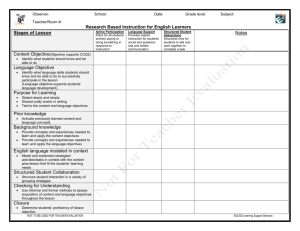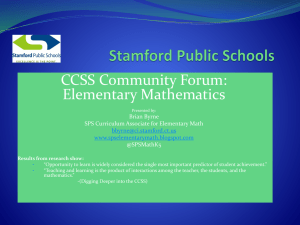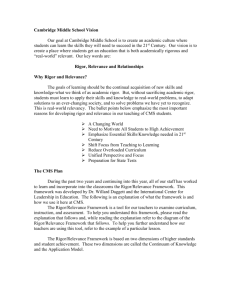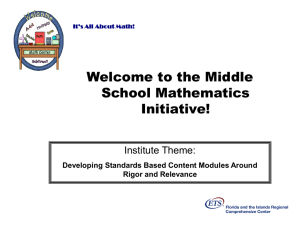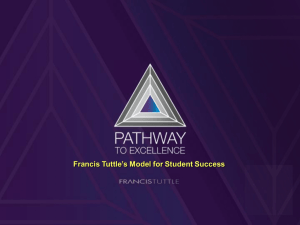Educator Webinar Series: For Teachers and Administrators
advertisement
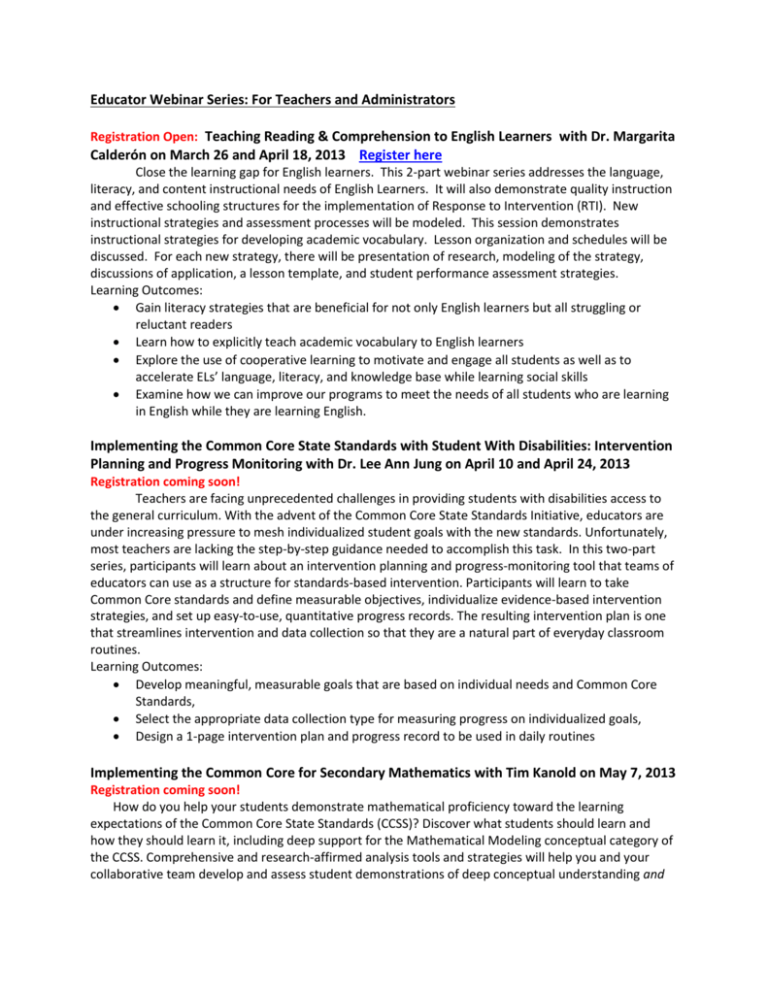
Educator Webinar Series: For Teachers and Administrators Registration Open: Teaching Reading & Comprehension to English Learners with Dr. Margarita Calderón on March 26 and April 18, 2013 Register here Close the learning gap for English learners. This 2-part webinar series addresses the language, literacy, and content instructional needs of English Learners. It will also demonstrate quality instruction and effective schooling structures for the implementation of Response to Intervention (RTI). New instructional strategies and assessment processes will be modeled. This session demonstrates instructional strategies for developing academic vocabulary. Lesson organization and schedules will be discussed. For each new strategy, there will be presentation of research, modeling of the strategy, discussions of application, a lesson template, and student performance assessment strategies. Learning Outcomes: Gain literacy strategies that are beneficial for not only English learners but all struggling or reluctant readers Learn how to explicitly teach academic vocabulary to English learners Explore the use of cooperative learning to motivate and engage all students as well as to accelerate ELs’ language, literacy, and knowledge base while learning social skills Examine how we can improve our programs to meet the needs of all students who are learning in English while they are learning English. Implementing the Common Core State Standards with Student With Disabilities: Intervention Planning and Progress Monitoring with Dr. Lee Ann Jung on April 10 and April 24, 2013 Registration coming soon! Teachers are facing unprecedented challenges in providing students with disabilities access to the general curriculum. With the advent of the Common Core State Standards Initiative, educators are under increasing pressure to mesh individualized student goals with the new standards. Unfortunately, most teachers are lacking the step-by-step guidance needed to accomplish this task. In this two-part series, participants will learn about an intervention planning and progress-monitoring tool that teams of educators can use as a structure for standards-based intervention. Participants will learn to take Common Core standards and define measurable objectives, individualize evidence-based intervention strategies, and set up easy-to-use, quantitative progress records. The resulting intervention plan is one that streamlines intervention and data collection so that they are a natural part of everyday classroom routines. Learning Outcomes: Develop meaningful, measurable goals that are based on individual needs and Common Core Standards, Select the appropriate data collection type for measuring progress on individualized goals, Design a 1-page intervention plan and progress record to be used in daily routines Implementing the Common Core for Secondary Mathematics with Tim Kanold on May 7, 2013 Registration coming soon! How do you help your students demonstrate mathematical proficiency toward the learning expectations of the Common Core State Standards (CCSS)? Discover what students should learn and how they should learn it, including deep support for the Mathematical Modeling conceptual category of the CCSS. Comprehensive and research-affirmed analysis tools and strategies will help you and your collaborative team develop and assess student demonstrations of deep conceptual understanding and procedural fluency. You’ll also learn how fundamental shifts in collaboration, instruction, curriculum, assessment, and intervention can increase college and career readiness in every one of your students. Learning Outcomes: Discover the five essential paradigm shifts necessary to implement the CCSS for mathematics. Develop a “less is more” content mind-set: fewer standards will result in the opportunity of time needed for deeper rigor and conceptual understanding work with students. Gain helpful formative assessment strategies for development of student proficiency in the Standards for Mathematical Practice. Implementing the Common Core: Differentiating for Gifted and Talented with Martha Kaufeldt on May 8, 2013 Registration coming soon! Far too many of our brightest students are experiencing a glass ceiling as more and more of our resources of time and staff have been directed at getting all students to acceptable levels of achievement. Those students who already are achieving above those levels are often forgotten or asked to just support their peers. Across the nation we are seeing the achievement scores of these capable students flatten measuring little or no continuous improvement. Join Martha Kaufeldt, a national expert in the areas of gifted and differentiation, as she shares strategies to ensure our students at the far right of the continuum experience increased achievement and the joy of learning. Learning Outcomes: Discover innovative ways to use time and resources to ensure the continuous learning of our gifted students. Learn differentiation strategies to engage students at all points on the continuum without designing totally different lessons. Get your unique questions answered. Integrating Rigor and Relevance into Instruction for the Common Core with Dr. Robin Fogarty and Brian Pete on May 22, 2013 Registration coming soon! Rigor and relevance can be measured by determining the complexity of thinking and knowledge acquisition partnered with the application of said knowledge and skills. At the high end of rigor, knowledge is fully integrated into one’s mind, and individuals can do much more than locate information. They can take several pieces of knowledge and combine them in both logical and creative ways. The student can solve multistep problems and create unique work and solutions. The application of knowledge and skills brings relevance when students can use knowledge in one discipline, apply across disciplines, apply to real-world predictable situations, and ultimately apply to complex real-world unpredictable situations. Learning Outcomes: Acquire a thorough understanding of what rigor and relevance means for student achievement Develop a vision for what rigor “looks like” in the classroom Gain a basic toolkit of strategies to increase rigor and relevance without stress. How to Teaching Thinking Skills in the Common Core with Dr. Robin Fogarty and Brian Pete on June 10, 2013 Registration coming soon! Prepare your students to master the high-level thinking skills demanded by the CCSS. You'll learn how to address content with an interdisciplinary focus, making it relevant both in and out of the classroom. Using a simple template from How to Teach Thinking Skills Within the Common Core, learn how to encourage students to take ownership for their learning, application, and transfer of thinking. Learning Outcomes: Discover the desired student proficiencies of the CCSS: critical thinking, creative thinking, complex thinking, comprehensive thinking, collaborative thinking, communicative thinking, and cognitive transfer. Explore phase I, Talk-Through, during which teachers explicitly teach students a critical thinking skill. Learn how to make a direct connection between the selected thinking skill and the new standards with the CCSS performance tasks modeled in phase III.
